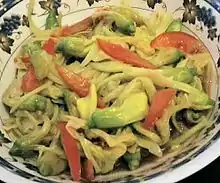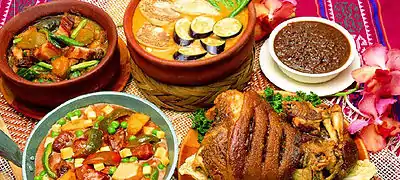Kinilnat
Kinilnat, or ensalada, is an Ilocano salad. Unlike the western concept of a salad, kinilnat is accompanied with the main course as a side dish.
 Kinilnat made of katuday flowers and tomatoes | |
| Alternative names | Ensalada |
|---|---|
| Type | Salad |
| Course | Side dish |
| Place of origin | Philippines |
| Region or state | Ilocos region |
| Serving temperature | Cold |
| Main ingredients | Regional vegetables (shoots, blossoms, unripe fruits) |
The leaves, shoots, blossoms, immature fruits or other parts of the vegetables are blanched, drained and dressed with bugguong munamun (anchovy paste) or patis (fish sauce), and sometimes souring agents like kalamansi, kamatis (tomatoes), or suka (vinegar).[1] Additionally, it can be seasoned with freshly ground laya (ginger) or sili (chilis). Common vegetables include:[2][3][4]
- kamotig, sweet potato leaves and shoots
- parya, bittermelon unripe fruits and leaves
- otong, string bean shoots and young pods
- karabasa, calabaza shoots and blossoms
- sayote, chayote shoots
- kalunay, amaranth leaves
- marunggay, moringa leaves and blossoms
- repolyo, cabbage leaves
- katuday, West-Indian pea blossoms
- pallang, winged beans pods
- parda, hyacinth bean pods
- sabunganay, banana blossoms
- pako, fern shoots[5]
References
- "Kinilnat | Traditional Salad From Ilocos | TasteAtlas". www.tasteatlas.com. Retrieved September 27, 2023.
- Pinkabet (website). "Alukon leaves stew"
- Dumilag, Richard V. (January 2, 2018). "Unmasking a cryptic ethnotaxon: a case study on the identity of Dermonema virens (Nemaliales, Rhodophyta) in the Philippines". Webbia. 73 (1): 89–96. doi:10.1080/00837792.2018.1437591. ISSN 0083-7792. Retrieved September 27, 2023.
- Cacatian, Shella B.; Tabian, John Lester T. (May 5, 2023). "Floristic composition and diversity of indigenous wild food resources in northwestern Cagayan, Philippines". Biodiversitas Journal of Biological Diversity. 24 (4). doi:10.13057/biodiv/d240446. ISSN 2085-4722. Retrieved September 27, 2023.
- Sarazawa, Katrina S; Sanidad, Remely A (March 2022). "Exploring the Food and Cultural Significance of Native Chicken in Ilocos Sur" (PDF). Asia Pacific Journal of Management and Sustainable Development. 10 (1): 10-16. Retrieved September 27, 2023.
This article is issued from Wikipedia. The text is licensed under Creative Commons - Attribution - Sharealike. Additional terms may apply for the media files.
